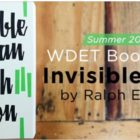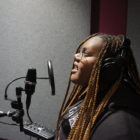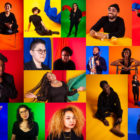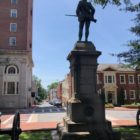Local That Works
When the pandemic started, KCAW worked hard to provide for the information needs of our rural, isolated communities throughout Southeast Alaska – our small staff worked day and night to share closures and public health information, while trying to prevent catastrophic rumor-mongering. Yet, we learned that the needs of our community were more than informational; they were emotional. Social distancing erased our human connections.
In April of 2020, a local nonprofit partnered with KCAW to meet this emotional need. That nonprofit is Artchange, and their mission is to support the creation of documentary media, contemporary art and community projects/events that foster participation, collaboration and interaction.
Search & Filter Projects
147 results found.
Projects
Local Aliens and Valley Sounds: Promoting Huntsville’s Local Musicians
WLRH Huntsville Public RadioWDET Book Club
WDET 101.9 FM
Reimagination
WYEP, Pittsburgh Community Broadcasting Corporation
WBGO Livestream and Education Hubs
WBGO Newark Public Radio
KZMU Live Radio Plays
KZMU Moab Community RadioThe ARTery 25: Millennials of Color Impacting Boston Arts and Culture
90.9 WBUR
ArtsLight
Lower Cape Community TV (LCCTV)Student Composer Fellowships and Ambassadors
WFCL 91Classical, Nashville Public RadioSouth Florida PBS film-maker project
South Florida PBS WPBT and WXELMarked By These Monuments
WTJU
Kansas City PBS Reproductive Rights Initiative
khudson@kansascitypbs.org
https://kansascitypbs.org/reproductiverights
Key Components of the Reproductive Rights Package
On-Air Coverage-The Flatland show is a collaborative effort between our production and journalism teams that offers a monthly program taking a deep dive into a single topic that is raising questions in our community. The July 21st episode begins with a documentary short featuring b-roll and, interviews with local experts. This short was followed by an in-studio session moderated by show host, D. Rashaan Gilmore. The program was distributed over the air, through the PBS video app, on YouTube and online at flatlandkc.org.
Show Link: https://video.kansascitypbs.org/video/reproductive-rights-1q7dy2/
curiousKC: The team put the call out for reproductive rights questions through social media, over broadcast and via an online form. Submissions from our community informed throughlines in our reporting on the topic of reproductive rights.
Efforts sourcing audience questions resulted in the following articles:
curiousKC | A Guide to What You’ll See in the Aug. 2 Kansas Primary About Abortion
Twitter Space: Moderated by Flatland show host, D. Rashaan Gilmore, the discussion included senior reporter Mary Sanchez and a panel of local experts. It provided additional context to some of the overarching themes of the show and presented the listeners with a chance to weigh in, in real-time. Link to Recorded Twitter Space: https://twitter.com/i/spaces/1yoKMWWZOwwJQ
Engagement Event: Our team also planned an event in collaboration with community partner American Public Square, “A Community Conversation on Reproductive Rights” which was moderated by our senior reporter Mary Sanchez. The event (offered virtually and in-person) convened a panel of local experts to discuss the economic, legal and human implications of the decision. Event Link: https://americanpublicsquare.org/event/a-community-conversation-on-reproductive-rights/
Journalism: Throughout the course of the project we posted 14 articles to our website which were promoted through a variety of distribution avenues to reach a diversity of audiences. Posted content was written by our own journalists, supplied by regular contributors and shared by various KC Media Collective Partners, and focused on a wide range of angles on the topic.
Our team went behind the contentious debate and provided a platform for the voices of those affected. The Reproductive Rights package is a true representation of the thoughtful, nuanced, and educational approach that guides our everyday work. The multimedia approach to content truly found audiences where they are and offered a path to balance and in-depth coverage regardless of where people find their information. We’re continuing to cover new angles after most press (especially national) have stepped back, now that the August 2 vote is passed. Over the course of the project to date and spanning the various content components we garnered 38,351 impressions (page views, broadcast impressions, social media post impressions, etc…). In a post-event survey, nearly 80% of respondents indicated that they gained insight into the topic.
Comments: “I appreciated attending with the group. Very nice selection for the panel. There was spontaneous applause (against the rules, I know) when the doula talked about the effect of the abortion bans on BIPOC people.” “This program was great. Now watching both sides' ads on TV--both have inaccurate information. That should be called out.” "With so much polarizations around political or social issues it is great to see people with vastly different views speaking civilly to each other was refreshing and educational. Modeling behavior is one of the ways we learn, please keep it up!”


